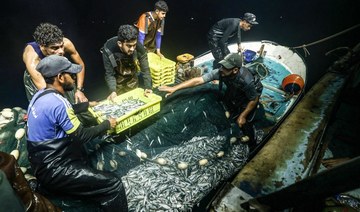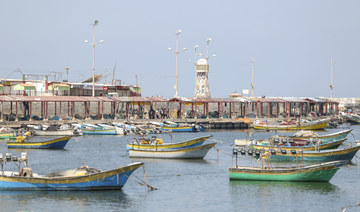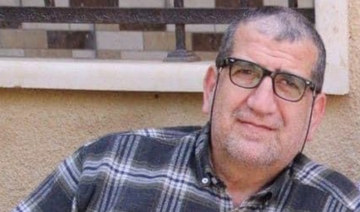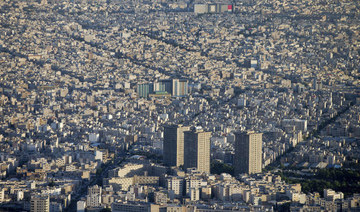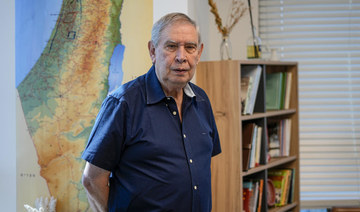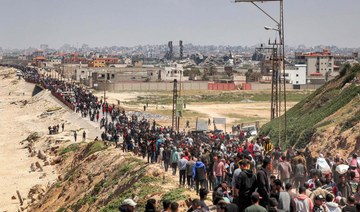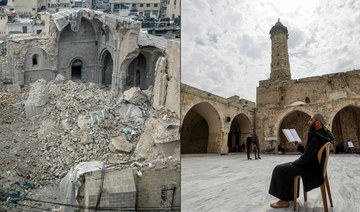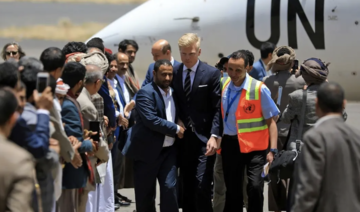GAZA CITY, Palestinian Territories: Gaza fisherman Jihad Al-Hissi is used to rough waters but he now faces a new storm. An Israeli court may seize his boat after he breached the limits of the enclave’s fishing zone.
The issue is crucial for thousands in the blockaded Palestinian territory of 2.3 million people, where fishing in the Mediterranean Sea remains one of the few economic lifelines.
Hissi, 55, with square shoulders and a scruffy beard, told his story at Gaza’s dock early one morning as fishermen sold their overnight catch of sea bream, prawns and sardines.
For now he has his boat, but its fate is uncertain as Israeli authorities argue before a Haifa court that it should be permanently taken away.
The vessel, used to catch gamberi prawns off southern Gaza near Egypt, is named the “Hajj Rajab,” but its owners have erased the name from its yellow hull.
“I don’t want the Israelis to spot us and seize my boat,” said Hissi, who had a violent encounter with an Israeli naval patrol boat more than a year ago.
Israel says its land, air and sea blockade of Gaza is needed to protect it from rocket and other attacks from Hamas and to prevent arms smuggling to the Islamist militant movement.
Palestinians argue it is an effective siege that has crippled Gaza’s economy and further impoverished its people, while the fishing limits deny it crucial protein.
Last year’s incident came on February 14 when Hissi’s vessel ventured beyond the maritime zone that Israel declared in 2007, the year Hamas seized power in Gaza.
Jihad’s brother Nihad, who was at sea that day, said that “100 meters beyond the area, we were surprised by three Israeli boats with commandos.
“They attacked our boat ... tied us up and arrested us.”
The boat’s cabin is still damaged from the water cannon blasts and the rubber-encased bullets fired by the Israeli forces that day.
Israel, in documents presented to court, accuses Hissi of having “repeatedly violated the security restrictions imposed by the Israeli army in the maritime zone adjacent to Gaza.”
The Israeli non-government group Gisha has helped defend Hissi and in September secured the boat’s return, but Israeli authorities now demand the court “permanently confiscate” the vessel.
The fishing zone allowed by Israel currently extends only to the heavily fished areas between six and 15 nautical miles (about 11 to 28 kilometers) off the Gaza coast.
Hissi argues this is less than the maximum of 20 nautical miles agreed in the 1990s under the Israeli-Palestinian agreements in Oslo.
But he also admits to going even beyond that from time to time, in search of shrimp which nets around $21 per kilogram (2.2 pounds) and can make the difference between profit and loss.
The legal fight is closely watched by thousands of fishermen in Gaza.
If Hissi’s boat is permanently confiscated, this would spell “a serious threat to the thousands of fishermen in Gaza, because it aims to put an end to fishing,” charged Nizar Ayyash, president of the union representing the 4,000 fishermen in Gaza.
The court battle comes amid a rise in Israel’s temporary seizures of fishing boats suspected of smuggling or breaching the fishing zone.
Last year saw 23 boat confiscations, the highest number since 2018, according to the Palestinian non-governmental group Al-Mezan.
The group also recorded 474 security incidents involving Gaza fishermen last year, the most in five years.
Gisha lawyer Muna Haddad argued that the case was “outrageous” and came amid “an unprecedented escalation in targeting those fishermen.”
Haddad accused Israel of misusing provisions of international law on armed conflict regarding the seizure of enemy ships by imposing them on civilians.
In the court documents seen by AFP, Israel claims Hissi “abused” legal protections and that his crew had “threatened” the safety of soldiers during the maritime seizure.
Israeli military officials assured AFP they wanted to support Gaza’s economy — but without compromising Israel’s security.
“We fish to survive,” said Hissi, whose family once lived in Jaffa, now part of Tel Aviv, before fleeing to Gaza during the 1948 war.
“And we will continue to fish even when our profits are low. I don’t know how to do anything else in life anyway.”
Gaza fisherman tests waters in legal fight over Israeli blockade
https://arab.news/67dxs
Gaza fisherman tests waters in legal fight over Israeli blockade
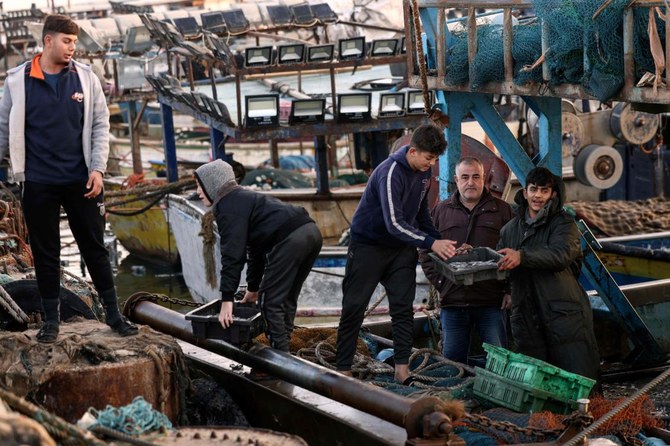
- Palestinians argue it is an effective siege that has crippled Gaza’s economy
- Fishing zone currently extends to only between 11km and 28km off the Gaza coast
Iran closed nuclear facilities in wake of Israel attack: IAEA chief
Speaking to journalists on the sidelines of a UN Security Council meeting, International Atomic Energy Agency (IAEA) chief Rafael Grossi was asked whether he was concerned about the possibility of an Israeli strike on an Iranian nuclear facility in retaliation for the attack.
“We are always concerned about this possibility. What I can tell you is that our inspectors in Iran were informed by the Iranian government that yesterday (Sunday), all the nuclear facilities that we are inspecting every day would remain closed on security considerations,” he said.
The facilities were to reopen on Monday, Grossi said, but inspectors would not return until the following day.
“I decided to not let the inspectors return until we see that the situation is completely calm,” he added, while calling for “extreme restraint.”
Iran launched more than 300 drones and missiles at Israel overnight from Saturday into Sunday in retaliation for an air strike on a consular building in Damascus that killed seven of its Revolutionary Guards, two of them generals.
Israel and its allies shot down the vast majority of the weapons, and the attack caused only minor damage, but concerns about a potential Israeli reprisal have nevertheless stoked fears of all-out regional war.
Israel has carried out operations against nuclear sites in the region before.
In 1981, it bombed the Osirak nuclear reactor in Saddam Hussein’s Iraq, despite opposition from Washington. And in 2018, it admitted to having launched a top-secret air raid against a reactor in Syria 11 years prior.
Israel is also accused by Tehran of having assassinated two Iranian nuclear physicists in 2010, and of having kidnapped another the previous year.
Also in 2010, a sophisticated cyberattack using the Stuxnet virus, attributed by Tehran to Israel and the United States, led to a series of breakdowns in Iranian centrifuges used for uranium enrichment.
Israel accuses Iran of wanting to acquire an atomic bomb, something Tehran denies.
’No longer a shadow war’: Iran says attack on Israel marks strategic shift
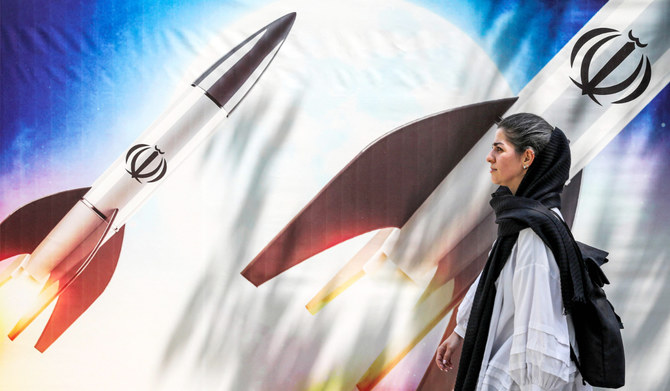
- Israel’s military said it intercepted 99 percent of the aerial threats with the help of the United States and other allies, and that the overnight attack caused only minor damage
- Israel has killed at least 33,797 Palestinians in Gaza, mostly women and children, according to the health ministry in the Hamas-run territory
TEHRAN: Iran’s missile and drone barrage against Israel was the first act of a tough new strategy, Tehran says, warning arch foe Israel that any future attack will spark “a direct and punishing response.”
This spells a dramatic shift from past years in which the Islamic republic and Israel have fought a shadow war of proxy fights and covert operations across the Middle East and sometimes further afield.
Iran from late Saturday launched hundreds of drones and missiles, including from its own territory, directly at Israel, to retaliate for a deadly April 1 strike on Iran’s consulate in Damascus.
Israel’s military said it intercepted 99 percent of the aerial threats with the help of the United States and other allies, and that the overnight attack caused only minor damage.
Iran said it had dealt “heavy blows” to Israel and hailed the operation as “successful.”
“Iran’s victorious... operation means that the era of strategic patience is over,” the Iranian president’s political deputy, Mohammad Jamshidi wrote on X.
“Now the equation has changed. Targeting Iranian personnel and assets by the regime will be met with a direct and punishing response.”
President Ebrahim Raisi said the operation had “opened a new page” and “taught the Zionist enemy (Israel) a lesson.”
Iran said it acted in self-defense after the Damascus strike levelled the consular annexe of its embassy and killed seven members of the Islamic Revolutionary Guard Corps (IRGC), including two generals.
Western governments denounced Iran’s retaliation as “destabilising the region.”
Iran, however, insisted the attack was “limited” and urged Western nations to “appreciate (its) restraint” toward Israel, especially since the outbreak of the Gaza war on October 7.
Regional tensions have soared amid the Israel-Hamas war which has drawn in Iran-backed armed groups in Lebanon, Syria, Iraq and Yemen.
Several IRGC members, including senior commanders, have been killed in recent months in strikes in Syria which Iran has also blamed on Israel.
Since the 1979 Islamic revolution, Iran has frequently called for Israel’s destruction and made support for the Palestinian cause a centerpiece of its foreign policy.
But it had refrained from directly striking Israel until Saturday, an attack on a scale which appeared to catch many in the international community by surprise.
For decades, Iran relied on a network of allied groups to exert its influence in the region and to deter Israel and the United States, according to experts.
A 2020 report by the Washington Institute said that Tehran had adopted a policy of “strategic patience,” which had “served it well since the inception of the Islamic republic in 1979.”
Former moderate president Hassan Rouhani was a staunch defender of the strategy, especially following Washington’s 2018 withdrawal from a landmark nuclear deal, advocating for Tehran not to take immediate countermeasures and taking a longer view.
Even after the 2020 US killing of Qasem Soleimani, an IRGC commander revered in Iran, Tehran gave prior warning to Washington, US sources said, before it launched missiles against two American bases in Iraq, and no soldiers were killed in the attack.
After Saturday’s attack on Israel, Guards chief Hossein Salami also said Iran was “creating a new equation.”
“Should the Zionist regime attack our interests, our assets, our personnel and citizens at any point, we will counterattack it from the Islamic Republic of Iran,” he was quoted as saying by local media.
The attack was also hailed as a “historic” success by Iranian media, with the government-run newspaper Iran saying the offensive “has created a new power equation in the region.”
The ultra-conservative daily Javan said the attack was “an experience Iran needed, to know how to act in future battles” and that it would make Israel “think long before (committing) any crime” against Tehran.
The reformist Ham Mihan newspaper said the attack “ended the status quo and broke the rules of the conflict that pitted the two sides against each other for 20 years and pushed the situation into another phase.”
“This is no longer a shadow war,” it said.
Lebanese officials charge Mossad killed Hamas financier
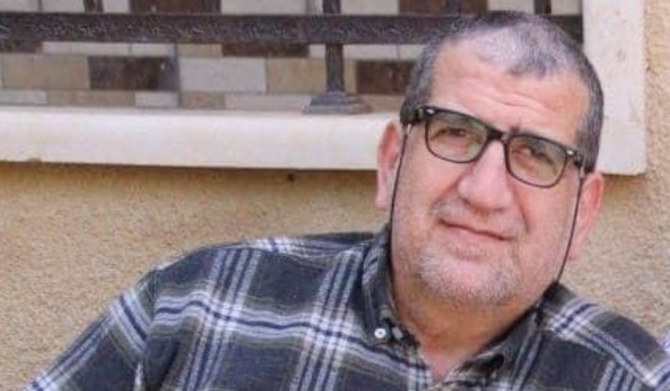
- A Lebanese judicial official and a security source told AFP that Mossad likely masterminded Sarur’s killing, both speaking on condition of anonymity as they were not authorized to speak to the press
BEIRUT: A Lebanese minister and two senior officials said preliminary findings suggest Israel’s Mossad spy agency was behind the killing of a US-sanctioned Lebanese man accused of sending Iranian money to Hamas.
The body of Mohammad Sarur, 57, was found riddled with bullets in a villa in the Lebanese mountain town of Beit Mery last Tuesday.
Interior Minister Bassam Mawlawi told Al-Jadeed TV late Sunday that, “according to the data we have so far, (the killing) was carried out by intelligence services.”
Asked whether he was referring to Mossad, Mawlawi confirmed.
AFP has requested comment from Israeli government officials but has received no response so far.
The US Treasury said in August 2019 that it had sanctioned Sarur for funnelling “tens of millions of dollars” from Iran’s Revolutionary Guards “to Hamas for terrorist attacks originating from the Gaza Strip,” through Lebanon’s Hamas-allied Hezbollah.
The Lebanese group has been exchanging near daily cross-border fire with the Israeli military since October 7 when Hamas launched its unprecedented attack on Israel, triggering the war in Gaza.
A Lebanese judicial official and a security source told AFP that Mossad likely masterminded Sarur’s killing, both speaking on condition of anonymity as they were not authorized to speak to the press.
“The preliminary results of the investigation indicate that the Israeli Mossad was behind the assassination,” the security official told AFP.
Initial findings “suggest the Mossad used Lebanese and Syrian agents to lure Sarur to a villa in Beit Mery,” the official said, adding that they had wiped fingerprints from the crime scene and used silenced weapons.
The judicial official also told AFP that preliminary information pointed to Mossad, but that the probe was ongoing, with investigators collecting evidence “especially from communications data.”
The US Treasury said Sarur “served as a middle-man” for money transfers between the (Revolutionary) Guards and Hamas “and worked with Hezbollah operatives to ensure funds were provided” to Hamas’s armed wing.
Sarur “has an extensive history working at Hezbollah’s sanctioned bank, Bayt Al-Mal,” the Treasury said.
In January 2019, the Lebanese army said it had arrested a suspected Mossad agent over a failed bid to assassinate a Hamas official in the country’s south a year earlier.
In the 1970s, Israel launched a targeted assassination campaign against Palestinian militants in retaliation for the killing of 11 Israelis at the 1972 Munich Olympics, leaving several militants dead in Beirut.
Israeli military pledges response to Iran attack amid calls for restraint
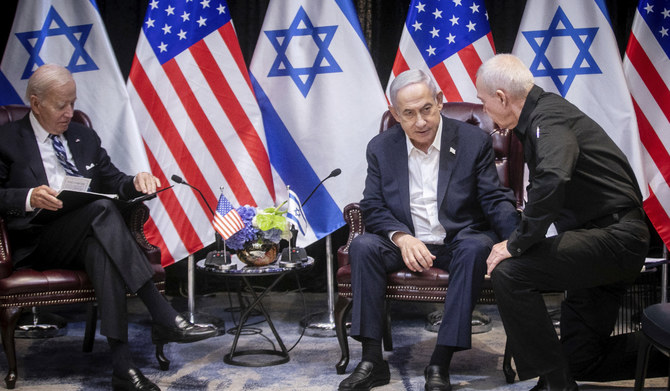
- Iran mounted its attack after the April 1 killing in Damascus of seven Iranian Revolutionary Guards officers, including two senior commanders
- Israel has killed at least 33,797 Palestinians in Gaza, mostly women and children, according to the health ministry in the Hamas-run territory
JERUSALEM: Israel’s military chief said on Monday his country would respond to Iran’s weekend missile and drone attack amid calls for restraint by allies anxious to avoid an escalation of conflict in the Middle East.
Prime Minister Benjamin Netanyahu summoned his war cabinet for the second time in less than 24 hours to weigh how to react to Iran’s first-ever direct attack on Israel, a government source said.
Israel’s military Chief of Staff Herzi Halevi said the country would respond, but provided no details.
“This launch of so many missiles, cruise missiles, and drones into Israeli territory will be met with a response,” he said at the Nevatim Airbase in southern Israel, which sustained some damage in Saturday night’s attack.
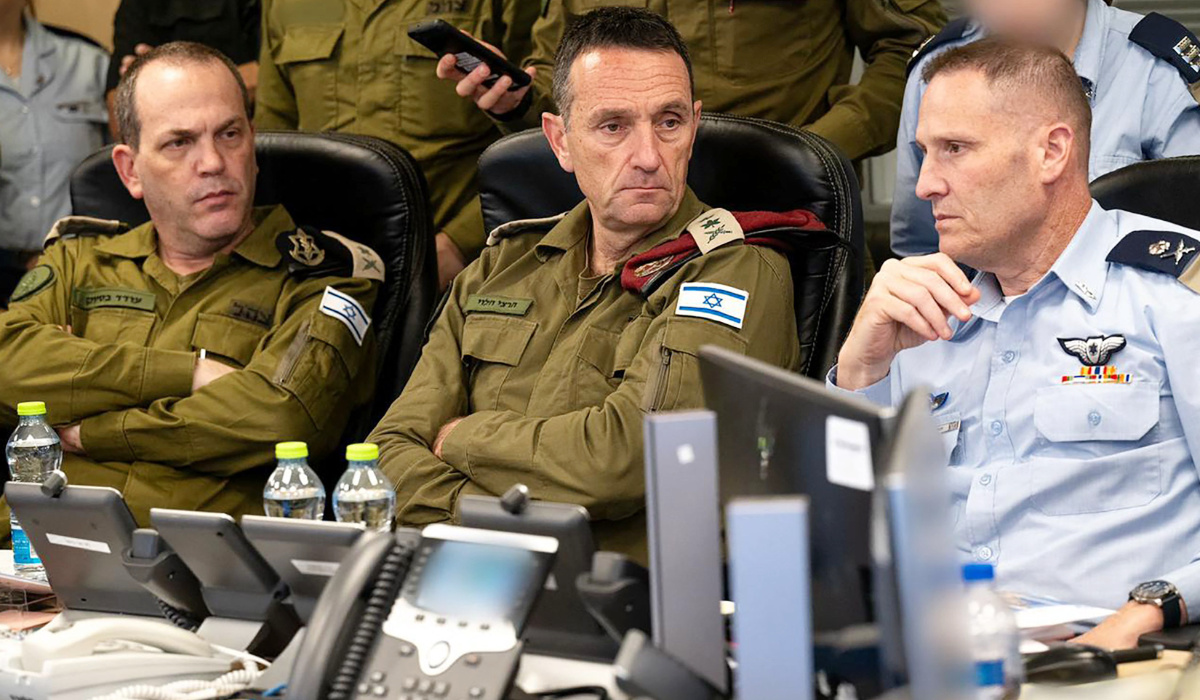
Iran’s attack — launched in retaliation for a suspected Israeli airstrike on its embassy compound in Damascus on April 1 — has increased fears of open warfare between Israel and Iran and heightened concerns that violence rooted in the Gaza war is spreading further in the region.
Wary of the dangers, President Joe Biden told Netanyahu the United States will not take part in any Israeli counter-offensive against Iran, officials said on Sunday.
Since the start of the war in Gaza on Oct. 7, clashes have erupted between Israel and Iran-aligned groups in Lebanon, Syria, Yemen and Iraq. Israel said four of its soldiers were wounded hundreds of meters inside Lebanese territory overnight.
It appeared to be the first such known incident since the Gaza war erupted, although there have been months of exchanges of fire between Israel and Lebanon’s armed group Hezbollah.
“We’re on the edge of the cliff and we have to move away from it,” Josep Borrell, the European Union’s foreign affairs chief, told Spanish radio station Onda Cero. “We have to step on the brakes and reverse gear.”
French President Emmanuel Macron, German Chancellor Olaf Scholz and British Foreign Secretary David Cameron made similar appeals. Washington and United Nations Secretary-General Antonio Guterres have also issued calls for restraint.
White House national security spokesman John Kirby declined on Monday to say during a briefing whether Biden urged Netanyahu in talks on Saturday night to exercise restraint in responding to the attack.
“We don’t want to see a war with Iran. We don’t want to see a regional conflict,” said Kirby, adding that it was up to Israel to decide “whether and how they’ll respond.”
Countries including France, Belgium and Germany summoned the Iranian ambassadors. The French foreign ministry said France was working with its partners to de-escalate the situation.
Russia has refrained from criticizing its ally Iran in public over the strikes but expressed concern about the risk of escalation on Monday and also called for restraint.
“Further escalation is in no one’s interests,” Kremlin spokesman Dmitry Peskov said.
Iran mounted its attack after the April 1 killing in Damascus of seven Iranian Revolutionary Guards officers, including two senior commanders. Israel neither confirmed nor denied carrying out the attack.
Iran’s retaliatory attack, involving more than 300 missiles and drones, caused modest damage in Israel and wounded a 7-year-old girl. Most were shot down by Israel’s Iron Dome defense system and with help from the US, Britain, France and Jordan.
In Gaza itself, where more than 33,000 Palestinians have been killed in the Israeli offensive according to Gaza health ministry figures, Iran’s action has drawn applause.
Israel began its campaign against Hamas after the Palestinian militant group attacked Israel on Oct. 7, killing 1,200 people and taking 253 hostages by Israeli tallies.
G7 MULLS SANCTIONS
In Washington, Biden reiterated US commitment to Israel’s security ahead of a meeting with Iraqi Prime Minister Mohammed Shia Al-Sudani.
Sudani, speaking alongside Biden, said their views may be divergent about what is happening in the region but they wanted to stop the conflict from expanding.
British Prime Minister Rishi Sunak said the Group of Seven major democracies were working on a package of coordinated measures against Iran.
“I spoke to my fellow G7 leaders, we are united in our condemnation of this attack,” Sunak said in parliament.
Italy, which holds the rotating presidency of the G7, said it was open to new sanctions against individuals engaged against Israel.
In an interview with Reuters, Italian Foreign Minister Antonio Tajani said new sanctions would need the backing of all the G7. He suggested any new measures would be focused on individuals rather than whole nations.
“If we need to have more sanctions for people clearly engaged against Israel, supporting for example terrorism, supporting Hamas, it is possible to do it,” Tajani said.
Iran’s attack has caused travel disruption, with at least a dozen airlines canceling or rerouting flights, and Europe’s aviation regulator reaffirming advice to airlines to use caution in Israeli and Iranian airspace.
Iraqi Airways announced a resumption of flights between Iraq and Iran on Tuesday.
Israel remained on high alert, but authorities lifted some emergency measures that had included a ban on some school activities and caps on large gatherings.
Iranian Foreign Minister Hossein Amirabdollahian said Tehran had informed the United States that the attack on Israel would be limited and for self-defense, and that regional neighbors had been informed of the planned strikes 72 hours in advance.
Iranian Foreign Ministry spokesperson Nasser Kanaani said on Monday, however, that no pre-arranged agreement was made with any country prior to the weekend attack.
Kirby said that Iran did not warn the United States in advance of the attack’s timeframe or targets, calling reports that Tehran had done so “categorically false.”
Peace hopes for Yemen must not become collateral damage of other regional conflicts, UN envoy says

- Hans Grundberg warns of acute need for regional deescalation amid concerns about rising food insecurity and reemergence of cholera in Yemen
- US deputy ambassador Robert Wood repeats ‘call for Iran to stop these illegal weapons transfers and to stop all activities that facilitate the Houthis’ reckless attacks’
NEW YORK CITY: The UN’s special envoy for Yemen on Monday said that while it is clear that the war in the country has connections to other conflicts in the region, “we owe it to the Yemenis to ensure that resolving the conflict in Yemen is not made contingent upon the resolution of other issues.”
Hans Grundberg added: “We cannot risk Yemen’s chance for peace becoming collateral damage” caused by other conflicts.
Speaking during a meeting of the Security Council to discuss the latest developments in the country, he said the threat of further attacks the Red Sea persists in absence of a ceasefire in Gaza, the urgent need for which was underscored by the latest escalation in hostilities between Israel and Iran.
Since the war between Hamas and Israel in Gaza began in October, attacks by the Iran-backed, Yemen-based Houthis on international shipping have continued to cause disruption to trade routes in the Red Sea. The militant group has threatened to continue the attacks until Israel ends its assault on Gaza. The UK and the US began to launch retaliatory military strikes against Houthi targets in Yemen in January.
There is an acute need for a deescalation of conflicts on a broader regional basis, Grundberg said as he warned: “If we leave Yemen’s political process in the waiting room and continue down this path of escalation, the consequences could be catastrophic, not only for Yemen but also for the wider region.”
Grundberg lamented that in contrast to last year, there was not much to celebrate this year during Eid Al-Fitr in Yemen.
“Detainees we had hoped would be released in time to spend Eid with their loved ones remain in detention,” he said. “Roads we had hoped to see open remain closed.
“We also witnessed the tragic killing and injury of 16 civilians, including women and children, when a residence was demolished by Ansar Allah individuals in Al-Bayda governorate,” he added, using the official name for the Houthis.
Briefing council members on the humanitarian situation in Yemen, Edem Wosornu, the director of operations and advocacy at the UN Office for the Coordination of Humanitarian Affairs, highlighted the rising levels of food insecurity in the country over recent months.
She said the situation deteriorated further after the World Food Program suspended the distribution of food aid in areas controlled by the Houthis in December 2023. This pause followed disagreements with local authorities about who should receive priority assistance, and was compounded by the effects of a severe funding crisis on WFP humanitarian efforts in Yemen.
It comes as greater percentage of households in southern Yemen struggle to obtain sufficient supplies of food compared with those in the north, in part because of the historically low exchange rate of Yemeni rial against the US dollar in areas controlled by the internationally recognized government.
“The most vulnerable people — including women and girls, marginalized groups such as the Muhamasheen, internally displaced people, migrants, asylum seekers and refugees, and persons with disabilities — still depend on humanitarian assistance to survive,” said Wosornu.
She also voiced concern about an increase in cases of cholera in Yemen amid the continuing deterioration of public services and institutions.
“The reemergence of cholera, and growing levels of severe malnutrition, are telling indicators of the weakened capacity of social services,” she told the council.
“Almost one in every two children under 5 are stunted, more than double the global average: 49 per cent compared to 21.3 per cent.
“Emergency stocks of essential supplies are almost depleted. And water, sanitation and hygiene support systems need urgent strengthening.”
The humanitarian response plan for Yemen is only 10 percent funded, with funding of its food security and nutrition programs standing at just 5 percent and 3 percent respectively, according to an informal update presented to the Security Council by the OCHA this week. Wosornu appealed to the international community to take urgent action to help fill the funding gaps.
The US deputy ambassador to the UN, Robert Wood, urged council members to persist in their demands that the Houthis halt attacks on shipping in the Red Sea.
“We must also do more to underscore the council’s concern regarding the Iranian origin of weapons used by the Houthis, and the ongoing violations of the arms embargo,” he added.
“It is no secret that Iran provides weapons to the Houthis in violation of the UN arms embargo. We repeat our call for Iran to stop these illegal weapons transfers and to stop all activities that facilitate the Houthis’ reckless attacks.
“Iran’s continuous efforts to foment instability and terror in the region, as demonstrated through this weekend’s unprecedented attacks by Iran against the State of Israel, need to be strongly condemned by this council.”



